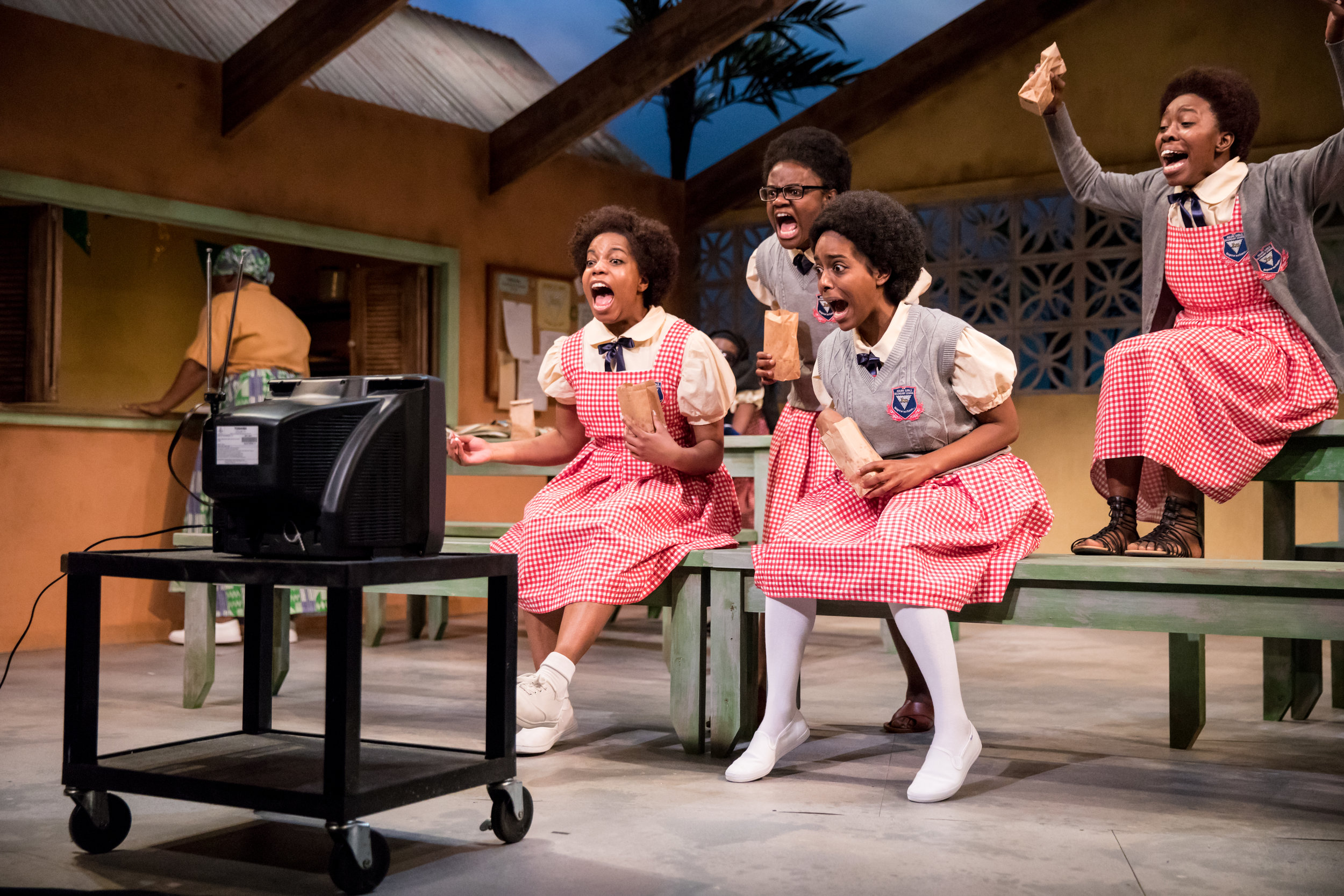REVIEW: School Girls, or the African Mean Girls Play @ Jungle Theater
The tale of the “it” crowd is all too familiar for just about anyone that’s been in high school. It doesn’t matter where you grew up because every school had that seemingly impenetrable clique. They exuded confidence and grace in a time when most of us were fighting our strange insecurities and awkward body issues. In our pubescent eyes, they had it all.
Set at Aburi Girls’ Senior High School in Ghana in 1986, Jungle Theater’s production of School Girls, or the African Mean Girls Play, is a highly entertaining story that brings an all-too-familiar American concept to the life.
The Queen Bee (aka Regina George) of the school, Paulina Sarpong (Ashe Jaafaru), makes her status known both in what she says and how she says it. She rules the school with both favors and cruelty. “Are you determined to look like a cow?” she pointedly asks her larger-sized classmate Nana (Salome Mergia) near the top of the show. Nana immediately exchanges her porridge for an apple, which is “a good source of fiber,” according to Paulina. Too bad the other members of her clique have no idea what that means, but they go along with Paulina’s cruel words with laughs, while she’s around, and later they apologize to Nana, proving that deep down they are more than just her cold-hearted pawns.
The main plot centers around the arrival of a recruiter for the Miss Ghana beauty pageant, and the girls upcoming audition to become Miss Ghana 1986. As the HBIC of Aburi Senior High, Paulina is sure to win and has made it clear that while it is “necessary” for the other girls to audition, they don’t stand a chance. In addition to the shy Nana, there is Mercy (Kiara Jackson) and her cousin Gifty (Nimene Sierra Wureh), the comedic duo of that show that are both considered “average beauties,” and Ama (Aishe Keita), a smart and sensible girl, who is completely uninterested in the pageant but a willing participant nonetheless.
While it seems like Paulina is the “perfect” (and only) choice to represent Ghana, her status and prowess are suddenly threatened when a new girl transfers from America. The mixed-race daughter of a local cocoa tycoon Ericka (Eponine Diatta) is an immediate draw for the other girls, who fawn over her lotions, hair products, concert stories, and lighter skin, quickly forgetting about poor Paulina. With Ericka in the picture, Paulina’s chances at winning Miss Ghana 1986 are suddenly at risk, and she very quickly proves that she’ll do just about anything to bring home the crown.
When Eloise (Hope Cervantes), the recruiter for the Global Universe Pageant and former Miss Ghana 1966, finally arrives she makes it clear that while she wants to find a girl to represent Ghana well, but she also wants to find a girl that will appeal to a “wider” (aka whiter) audience. Eloise is hellbent on having Ghana showcased on the universal stage, and if she can find the perfect candidate not only will she get a raise but the all-girls school will receive a sizable donation. And while at first, the proposal seems unfair, Headmistress Francis (Ivory Doublette) decides to join in on the plan because after all, the school could use the money.
Even though it’s no secret this opportunity would mean the world to Paulina, in Eloise and Headmistress Francis’ eyes, Erika is their frontrunner. When the big day finally arrives, the auditions start off “promising” (including a well-played montage of “The Greatest Love of All”) but soon tensions rise, secrets are spilled, and the whole production is flipped on its side as all is revealed.
Playwright Jocelyn Bioh does a great job of creating a story that is not only highly engaging but packs a powerful punch in a short time. She is able to create a series of characters that grow and change believably in 75-minutes, a feat many shows try to accomplish but unfortunately do not. At no point do we lose interest in the show or turn our backs on Paulina, who could quickly be a bitch for which audiences hold no sympathy. And maybe it’s Jaafaru’s superior acting choices or maybe it’s Bioh’s complex writing but either way, it works and it works well. Like every “mean girl,” Paulina’s persona stems from deep insecurities, which surprise surprise, Ericka also seems to have.
School Girls is an ensemble show that delicately toes the line between hilarious and heartbreaking, and easily accomplishes much more than shows twice its length. Bioh should be proud because not only is Jungle Theater’s production a shining example of how her work should be presented on stage, but the play itself is impressive and in my personal opinion timeless. There will always be mean girls and unfortunately there will always be colorism within races.
“School Girls, or, The African Mean Girls Play”
When: Now - April 14
Where: Jungle Theater (2951 Lyndale Avenue)
Information: 612-822-7063 or jungletheater.com
(Photo by Dan Norman)
(Photo by Dan Norman)


